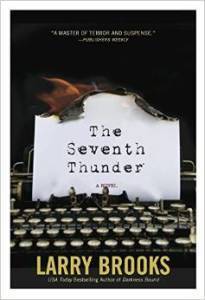Can Your Concept be TOO Big?
To open this can of worms…
Announcing the re-release of my novel, “The Seventh Thunder.”
The concept is massive. So much so it initially scared agents and publishers away.
A few years ago I used this novel as my calling card to find a new agent. Leveraging the endorsement of my former editor at Penguin-Putnam, I hit up 11 big-name New York agents with the pitch.
All eleven said, with varying degrees of enthusiasm, that they liked it. Three said they were certain it would be published. But not with them involved.
All eleven took a pass.
 It was too big. Too provocative. Too rooted in fact, it would make people uncomfortable. Davinci Code uncomfortable. Which made no sense to me since that book sold over 80 million hardcovers.
It was too big. Too provocative. Too rooted in fact, it would make people uncomfortable. Davinci Code uncomfortable. Which made no sense to me since that book sold over 80 million hardcovers.
Too often this business doesn’t make sense.
Can a concept be too big?
Depending on the genre, yes. If you don’t soften it with other things. And if you don’t play to the expectations of the genre’s audience.
The key in any genre is causing readers to suspend disbelief for the ride, and to use enough real-world elements to prop up what seems to be a leap. In sci-fi and fantasy the sky is the limit in this regard. But within a contemporary thriller, certain boundaries are in play.
My secular thriller, The Seventh Thunder, was pushing those boundaries.
In the story I leveraged a lot of real-life elements, which in and of themselves seemed like fiction. A hidden code within the original texts of the Torah (the first five books of the Bible; this has since been disproved by experts, but many still believe in it). A publicity-shy group of ultra-wealthy and powerful Christian men based in Washington (they allow the women to serve at their luncheons) who lobby world leaders to believe as they do. (Here’s a link to a 2003 Harper’s article about them.) Terrorist factions that justify their actions with radical Jihadist belief systems.
Then I pushed things by inserting a mysterious character who may or may not be an agent of something that is more than human. It’s an apocalyptic thriller (though secular, it’s not a “Christian” novel in that sense), after all. Angels and demons do have a role in such things.
And then I added a whopper of a “what if?” proposition.
There is a verse from Revelations (10:4) in which John is transcribing visions of the end of the world, using cryptic language and bizarre images to describe what he saw but couldn’t understand (how could a man who lived 2000 years ago possibly describe an Apache attack helicopter firing air-to-ground missiles?). Seven bowls. Seven trumpets. Seven scrolls. And then, finally, the seven thunders.
But then he is instructed by the angel who is delivering these visions to him to seal this up and “write them not,” because by the will of God no one can know these things, which will come to pass at the end of days.
I always wondered what it was that he saw. Logic says the visions would indicate when, where and how the prophesy would been ignited.
I considered writing a novel about the Rapture as described in Revelations (two guys named LeHaye and Jenkins beat me to it), and wondered what kind of spiritual mess I’d be in if I guessed at it and somehow came too close.
And then it hit me.
This would be the conceptual heart of my novel.
I would wrap my fiction around these real-life elements. In my novel a grieving author writes a book that speculates what those visions were. He looks at the unfolding world geo-political stage and takes a calculated guess at it.
It would soon become clear that he came too close.
When his book emerges from the slush pile and gets viral media buzz, it sends powerful forces of good and evil — one side seeking to eliminate the book and it’s author before publication, the other wanting nothing more than to thwart the will of God and put it on Page 1 — into a frenzy of desperate action.
Because what he wrote is already in play in an election year, with dark agendas and huge consequences on both sides. Suddenly he is the pawn, even a lynchpin, in a global and perhaps supernatural tug of war, with everything at stake.
Big, right?
And it seems ripped, as they say, straight out of today’s headlines. In the upcoming election year, you’ll wonder if there is a little divine intervention going on, given the spooky level of real-world relevance, and considering the book was written in 2008 (then updated for this new issue).
Behold the resurrection… of this novel.
I eventually landed an agent, then another agent, and then a small publisher. The book won an award (2010 “Best Thriller,” Next Generation Indie Awards), and shortly thereafter a larger publisher (Turner, who also published Deadly Faux) scooped it up, and here we are.
The book was re-republished yesterday, December 2, in paperback, hardcover and, coming very soon, on Kindle. It can also be found in select Barnes & Noble stores; if its not there they will order it for you.
I hope you’ll give it a read and decide for yourself.
Think big. Never give up.
There is always, especially in this evolving marketplace, a second chance.
Can Your Concept be TOO Big? is a post from: Larry Brooks at storyfix.com
The post Can Your Concept be TOO Big? appeared first on Storyfix.com.



